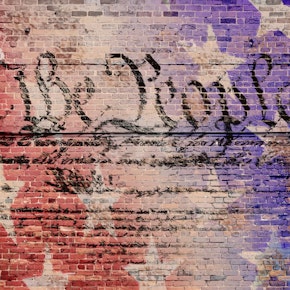USA
Justice


Creativity is as intrinsic to our species as any of our basic instincts, says Debbie Millman, designer and curator. But for millions of people in the United States, the ability to create has been thwarted. This basic human need, as important as love and shelter, Millman says, isn’t available for people serving time at the nearly 2,000 correctional facilities across America...


Many more Americans are struggling to survive and make ends meet than is typically portrayed in the media and public policy debates. And when poverty is depicted, harmful and inaccurate stereotypes often contribute to divisiveness rather than sympathy. Outdated measurement systems and unrealistic living standards have artificially kept U.S. poverty rates low over the past...


America’s “second founding” came on the heels of the Civil War, when the architects of the 13th, 14th and 15th amendments thought long and hard about how to enshrine civil rights that were truly for all into the U.S. Constitution. Despite an immediate backlash, including from the Supreme Court, and repercussions we’re still dealing with today, that second generation of fra...

Images communicate truths, and also lies. Learning to pay attention to photographs can help us discern. An art and cultural historian and a visual artist host a master class on how to read the visual record in the context of racial justice and equity.

When people in prison are given creative outlets, the impact is life-changing. Hear from a hip-hop artist setting up prison recording studios, an architect designing more humane spaces and a visual artist displaying letters, essays and poems from prisoners around the world.

The American prison and jail population has grown 500% since the 1970s, and calls for change are growing louder. Hear stories from a headlining musician and cultural leader, a nonprofit thinker and a MacArthur Fellow and scholar on the need to reinvent the toxic structures of incarceration.

While elected officials debate the necessity and scope of reparations for the historical stain of slavery, some individuals and private institutions with ties to the slave trade are stepping forward. What can we learn from their efforts to reckon with the past?

The pressure on cultural institutions to return artifacts to their places of origin is growing in intensity, but some argue that repatriation threatens the preservation and study of these treasures. Who, in the end, does history belong to?

From a father-daughter dance in a prison to playtime with incarcerated parents in a children’s museum, keeping families close has lasting ripple effects beyond bars. Hear from storytellers and leaders working inside the criminal justice system to help families stay connected.

The power of the judiciary to influence health made recent headlines when the US Supreme Court overturned Roe v Wade and Alabama’s top court ruled that embryos created through in vitro fertilization should be considered children. Upcoming state and federal cases related to health could further alter the landscape for abortion, and reshape the nation’s approach to gun right...


History has the power to teach us what to do in the present, but do we actually make good use of that tool? Many events in our recent past might suggest otherwise. American history is complex and full of pain, suffering and missteps. Harvard professor Imani Perry’s interdisciplinary work draws from African American studies, legal history and cultural studies to find insigh...

The unflinching humanity and morality that Martin Luther King, Jr. embodied is part of what makes his legacy so lasting. In addition to his preeminent civil rights work, he spoke out about worker protections, access to housing, and warmongering. Watch and listen as Aspen Ideas speakers, some of whom worked with Martin Luther King, Jr., explain how he indelibly shaped the w...

Americans seem more culturally and ideologically divided than at any point in most of our lifetimes, with no prospect of bridging those divides any time soon. The only thing we seem to agree upon is that our politics are broken and our leaders are unable to solve the nation’s most fundamental challenges. What can be done to save American democracy from itself? Can we still...

Antisemitic incidents are on the rise in the United States, leaving Jewish communities feeling vulnerable — a sentiment both new and sadly familiar. Among the responses is the first ever U.S. National Strategy to Counter Antisemitism, released by the White House, advocating a whole-of-society approach because all of us are affected by hate and it takes all of us to fight i...

Over a century ago, Andrew Carnegie wrote the “Gospel of Wealth,” challenging his wealthy peers to be generous with their largesse. Today, in his new book, Ford Foundation president Darren Walker writes that inequality far surpasses that which Carnegie witnessed, and argues that the widening chasm between haves and have-nots demands a new approach to philanthropy.

From the Supreme Court's ruling on abortion rights to public health's role in addressing gun violence to the devastating human toll of the war in Ukraine, this year's Aspen Ideas: Health sessions tackled some of the most pressing issues driving headlines nationally and globally. Explore the timely conversations with top government officials, business leaders, public health...

The highest court often seems distanced from our day-to-day lives, but the rulings that come out of the Supreme Court are woven into the fabric of the nation. Though it aims to be apolitical, the court regularly hears cases that involve some of the most contentious questions dividing the nation, and its decisions can change the course of our social, political, and economic...

Hate takes many insidious forms: as a mass shooting targeting a Black community, as an antisemitic remark, as a wave of anti-Asian violence. Intolerance and hate crimes have spiked in recent years, and experts, activists, and community members themselves are working hard not only to quantify the problem but to find actionable solutions. What does it take to stop hate in co...

The Afternoon of Conversation is the Aspen Ideas Festival's pinnacle programming moment. Over 2,000 people gather in the Benedict Music Tent, an open-air venue with acoustics that mimic an amphitheater, to hear from global leaders, community change-makers, journalists, politicians, and more.

In the last decade, the people of democratic societies across the globe have elected autocratic leaders. These populist strongmen have undermined democratic institutions with a disregard for the rule of law, expertise, and the truth. Is their election the symptom of already advanced societal illnesses, or is it the disease itself? In countries where the damage to democracy...





